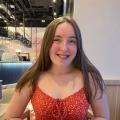
Money raised in memory of an Altrincham boy who died of leukaemia more than 20 years ago has helped to fund "important" research into childhood cancer.
Henry Gloag died in February 2003 when he was aged just six after being diagnosed with acute lymphoblastic leukaemia just six months before.
Last year Henry's mother, Jill Jenkinson, set up The Henry Gloag Fund as a Special Named Fund at Children’s Cancer and Leukaemia Group (CCLG) in order to mark the 20th anniversary with "something special."
Jill said: "Henry was an absolute little star and the treasure of our family.
"I had wanted to be a mum for quite a while, so when Henry came along it was a dream come true.
"We didn’t know that our baby would be born with an extra chromosome, so to find out that he had Down syndrome was a bit of a shock.
"The concern didn’t last too long, though, because Henry brought so much joy to everyone.
"He was happy, funny, loving and a little bit cheeky!
"He loved going to The Willows Primary School in Timperley, where he embraced learning and made many friends."
The Henry Gloag Fund puts the donations to the research into acute lymphoblastic leukaemia and shares photos of Henry for those who did not know him in his lifetime.
Jill added: "Funding cancer research is very important to me, especially because Henry’s dad died from a brain tumour only a few years after Henry passed away."
Some of the money is now being used to fund a new project led by Dr Elitza Deltcheva from University College London and titled "Developing ways to identify chemotherapy resistant B-cell acute lymphoblastic leukaemia cells".
This research could develop tests that could detect relapsed B-cell acute lymphoblastic leukaemia (B-ALL) and give doctors the tools to better monitor their patients during chemotherapy.
Dr Deltcheva will use leukaemia samples provided by the VIVO Biobank, as part of a new collaboration between the biobank and CCLG.
The biobank, co-funded by Cancer Research UK and Blood Cancer UK, stores the majority of children’s and young people’s cancer samples in the UK and the new partnership bypasses the need for researchers to collect cancer samples, allowing them to dedicate more time and funding to carrying out meaningful research.
Dr Deltcheva hopes to be able to predict which B-ALL cells are likely to survive treatment in order to find what makes them survive, to fight them better.
She said: "Even though cancer treatment is long and very toxic, some cancer cells can survive and cause the disease to return - sometimes years after the initial diagnosis.
"In this project, we are trying to understand what makes these cells different from the rest and how to identify them.
"Our ultimate goal is to develop tools that will help doctors identify the cells that may survive therapy and kill them from the onset.
"If successful, this could prevent relapses and cure more children."
Dr Deltcheva will use leukaemia samples provided by the VIVO Biobank, as part of a new collaboration between the biobank and CCLG.
The biobank, co-funded by Cancer Research UK and Blood Cancer UK, stores the majority of children’s and young people’s cancer samples in the UK and the new partnership bypasses the need for researchers to collect cancer samples, allowing them to dedicate more time and funding to carrying out meaningful research.
Jill said: “Having seen your child go through the most distressing time with tests, procedures, treatments and side effects, and then ultimately not making it through, it feels very important to do whatever I can to support research like this that will help other children going through something similar.
“I’m sure that Henry would be delighted that we are doing something so positive and helping other families like ours.
“If he had come through treatment successfully, I know that he’d have thrown himself into fundraising. It starts with 'fun' after all - that would be right up his street!”
Dr Deltcheva said: “As a parent myself, I can’t imagine the unbearable pain that one goes through when their child’s diagnosed with cancer.
"I’m truly honoured and grateful to have been given this special funding.
"Combined with the VIVO Biobank cancer samples, it will help me translate my research into the clinic faster.”



Comments: Our rules
We want our comments to be a lively and valuable part of our community - a place where readers can debate and engage with the most important local issues. The ability to comment on our stories is a privilege, not a right, however, and that privilege may be withdrawn if it is abused or misused.
Please report any comments that break our rules.
Read the rules here